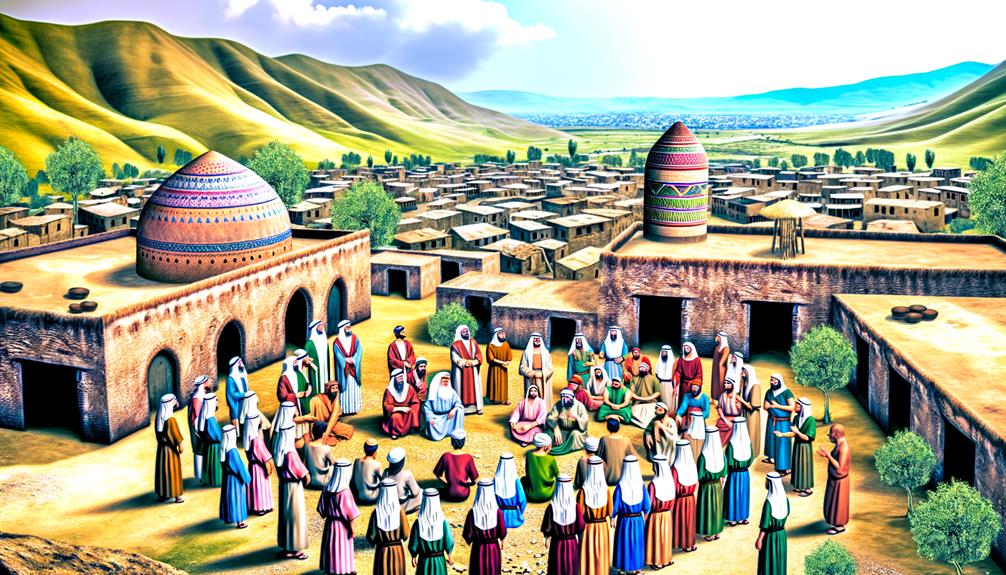Isom Meaning in the Bible: Hidden Significance
In the Bible, the name ‘Isom’ is significant for its historical, etymological, and theological dimensions. Derived from Hebrew and Aramaic, it conveys themes of strength, stability, and leadership.
Historically, ‘Isom’ appears in genealogies and territorial delineations, offering insight into the sociopolitical landscape of ancient Israel. It underscores tribal identity, governance, and the settlement patterns of the Israelite community.
Theologically, ‘Isom’ symbolizes divine guidance, covenant loyalty, and God’s unwavering promises. This multifaceted term enriches our understanding of the biblical narrative, hinting at deeper meanings and broader implications of divine-human interactions.

Isom Meaning in the Bible: Origin and Biblical Significance
| Aspect | Details |
|---|---|
| Name | Isom |
| Origin | Hebrew/Old English |
| Biblical Reference | Not directly mentioned in the Bible |
| Meaning | Derived from a place name, “iron home” |
| Spiritual Insight | Symbolizes strength, heritage, and stability |
| Use in Christianity | Represents rootedness and divine identity |
Historical Context of Isom

The name ‘Isom’ in the Bible is often examined through a multifaceted lens that includes historical, geographical, and cultural contexts.
Historically, the name appears in various ancient manuscripts and records, suggesting a lineage or tribal affiliation significant in biblical times.
Geographically, its occurrence can be traced to specific regions that were central to various biblical narratives, thereby providing insights into the sociopolitical dynamics of those areas.
Culturally, the name ‘Isom’ may have been associated with particular customs, practices, or societal roles, reflecting the complex interplay of identity and tradition.
Understanding ‘Isom’ within its historical context not only enriches biblical scholarship but also offers a nuanced perspective on the interconnectedness of history, geography, and culture in biblical accounts.
Etymology and Linguistic Roots

Frequently examined by scholars, the etymology of ‘Isom’ reveals its deep linguistic roots in ancient Semitic languages, providing critical insights into its original meaning and significance in biblical texts.
Derived from Hebrew and Aramaic origins, the term ‘Isom’ encompasses several nuanced interpretations.
- Hebrew Influence: In Hebrew, ‘Isom’ is often linked to meanings related to strength and stability, reflecting socio-cultural values.
- Aramaic Variations: Aramaic interpretations suggest connotations of leadership and resilience, indicative of its historical usage.
- Comparative Semitic Linguistics: Comparative studies across Semitic languages reveal interconnected themes of authority and foundation.
These linguistic roots not only underscore ‘Isom’s’ semantic richness but also illuminate its contextual relevance in biblical narratives, enhancing our understanding of its theological import.
Biblical References to Isom

Building on the etymological insights, exploring the biblical references to ‘Isom’ reveals its multifaceted role within the scriptural canon. The term ‘Isom’ appears in various contexts, often linked to specific locations and genealogical records.
These references highlight the term’s integral part in the historical and theological landscape of the Bible. Below is a table summarizing key references to ‘Isom’ in the Bible:
| Reference | Context | Significance |
|---|---|---|
| 1 Chronicles 1:38 | Genealogical record of descendants | Establishes lineage and heritage |
| Joshua 15:27 | Allocation of land to tribes | Indicates territorial delineation |
| Judges 1:36 | Boundary descriptions | Defines geographical boundaries |
| 2 Samuel 23:34 | Listing of David’s warriors | Highlights notable historical figures |
These references underscore ‘Isom’s’ deep-rooted connection to cultural and territorial identity.
Cultural Significance of Isom

While examining the cultural significance of ‘Isom’, it becomes evident that its various biblical mentions reflect its pivotal role in shaping the social and territorial fabric of ancient Israel.
The name ‘Isom’ appears in different contexts, each highlighting the multifaceted aspects of its cultural impact:
- Geographical Importance: Isom is often cited as a landmark, delineating tribal boundaries and influencing settlement patterns.
- Socio-Political Influence: References to Isom underscore its role in tribal identity and governance within the ancient Israelite community.
- Religious Connotations: The presence of Isom in religious texts signifies its importance in ritualistic practices and spiritual narratives.
These elements collectively underscore the integral role of Isom in the ancient Israelite milieu.
Theological Implications of Isom

Examining the theological implications of Isom reveals its profound significance in illustrating divine providence and covenantal themes within biblical narratives.
Historically, Isom is often seen as a symbol of God’s unwavering commitment to His promises, serving as a demonstration of His faithfulness.
Theologically, the name Isom encapsulates the essence of divine guidance and protection, resonating with the broader biblical motifs of God’s covenant with His people. This covenantal relationship underscores a deeper understanding of spiritual trust and obedience.
Additionally, Isom’s narrative role emphasizes the importance of divine intervention in human affairs, reflecting overarching themes of redemption and salvation within the Christian tradition.
Consequently, Isom functions as a narrative and theological anchor that reinforces God’s enduring presence and promises.
Conclusion
The exploration of Isom within biblical texts reveals a multifaceted term rich in historical and theological significance.
Rooted in ancient etymology, Isom’s scant yet impactful biblical references underscore its cultural resonance.
The theological implications of Isom invite further scholarly inquiry, promising to illuminate the intricate tapestry of biblical narratives.
Consequently, the study of Isom not only enriches understanding of sacred scriptures but also deepens appreciation for the complex interplay of language, culture, and divine revelation.






